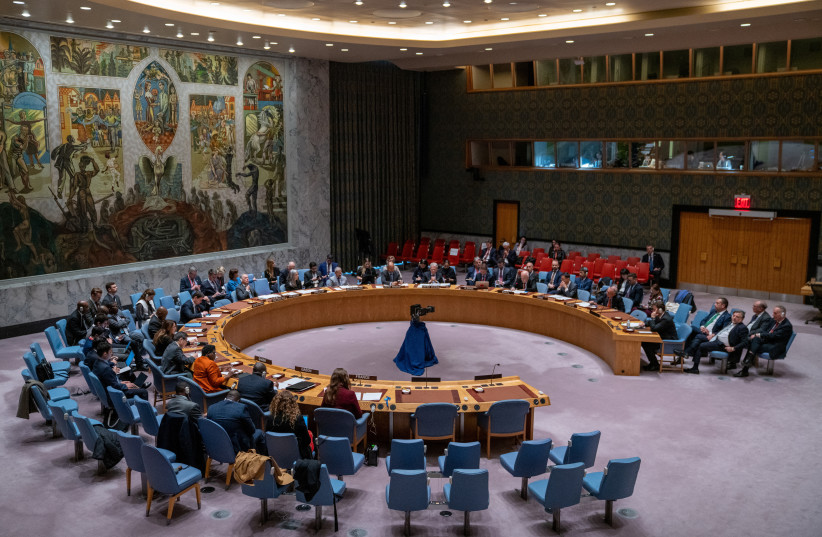There’s a lot of slime being slung around surrounding the divergent views that Israel and the US have over the continuation of the Gaza war.
Foremost is the notion - proliferating both here and in the US – that if only Prime Minister Benjamin Netanyahu were out of the picture, there would be no more impediments to reach a ceasefire and deal to release the hostages being held by Hamas.
What a crock. Granted, Netanyahu is a divisive figure, and Israel would be far better off in its effort to heal a fractured society if he resigned now instead of waiting to be pushed out following a post-war state inquiry.
Many don't trust him or believe his motives. There are growing questionable theories , whether emanating from left-wing cranks or from political opponents like Moshe “Boogie” Ya’alon, that he’s creating a crisis with the US or digging in for a prolonged campaign in Rafah simply to stay in power and keep his coalition together, and is sacrificing the hostages in the process.
However, the basic tenets that he espouses hold weight, regardless of his motives. A campaign in Rafah remains the only way to finish off the remaining Hamas fighters and leadership and bring them to their knees. Without it, Hamas will remain in power and in a matter of months, or years, will be ready for another deadly and brutal assault on Israel.

Likewise, the UNSC resolution calling for a ceasefire independent of a hostage release emboldens Hamas to reject any package that’s presented to achieve such a ceasefire. Netanyahu and members of his war cabinet like Defense Minister Yoav Gallant said at the outset that the war in Gaza could take months or more than a year, and would require determination and patience. There was no quick fix promised.
Those Israelis who breathlessly bellow “Bibi” and “Hamas” in the same breath as being flip sides of the same coin are doing grievous damage to the country and its efforts in Gaza. Social media is already full of ignorant posts that claim that Netanyahu is just as bad as Hamas and create an equivalency between hard-line militancy on the Israeli and Palestinians sides.
Replacing Netanyahu will not significantly change Israel's strategy
What they, and all those who want Netanyahu out, fail to realize is that, while the tension with the US may subside and a more diplomatic approach to bridging the gaps on a Rafah campaign and a ‘day after’ strategy may prevail, replacing Netanyahu with a Yair Lapid or Benny Gantz will not significantly change Israel’s strategy.
There’s a consensus - in the government, in the Knesset, and in the country – that eventually the IDF will have to take on Hamas in Rafah. That doesn’t seem likely to change, regardless of who is at Israel’s helm.
Would Lapid or Gantz have allowed relations with the US to reach the boiling point like Netanyahu has done, with his nearsighted decision to cancel the vital visit to Washington of Dermer and Hanegbi? Unlikely. There would be more diplomatic finesse and playing of the game, with the realization that Biden is a true friend of Israel who happens to be campaigning for reelection against an opponent whose victory would bode ill for both the US and Israel.
But their strategy of dealing with Hamas and the hostages would probably not stray far from the path the IDF has walked since October 7. It wouldn’t be long before those shouting that Bibi is the problem would just switch names and continue shouting.
Would a Gantz or Lapid be able to stand firm against the intense US pressure opposing a Rafah invasion and calling for a ceasefire unlinked to a hostage release, as the UN Security Council resolution which the US abstained from advocates? That may be Netanyahu’s main virtue, and the one that keeps him reigning as “King Bibi” among his faithful.
Either he doesn’t give a damn what the US thinks, so strong in his conviction that Hamas must die in order for Israel to live, or his critics are right and he’ll do anything to keep his coalition happy and stay in power.
By the time we find out what his real motive is, it may be too late – or it may not even matter. Israel and the US may be on an inevitable collision course over the direction of the war that nothing short of an Israeli agreement to a ceasefire and a de facto acknowledgment that Hamas will continue to rule Gaza and wreak havoc on Israel when they decide to can preempt. Nobody wants that, especially if it doesn’t include a guarantee of the hostages’ return.
If defeating Hamas isn’t an option that the world will allow Israel to pursue, then what do we tell the residents of the South and North who have been displaced, what do we say to the families of the 1,200 who were slaughtered on October 7 and the families of those still held in Gaza? And what do we say to the families of the soldiers who have fallen in the fight against the evil of Hamas?
The only way to make sense of those senseless deaths and the months of cruel captivity is to win the war and make Israel safe for its residents
Lost amid the thicket of accusations and resolutions and canceled trips is the clarity of what happened in the early morning of October 7. Hamas started this war and whatever has ensued since then falls squarely on their shoulders. Israel and the US are united on the mission that Hamas must go, but are mired in the pool of details of how to achieve that goal.
Now’s a good time to remember that although Netanyahu is a problem, he is not the problem. Hamas is.
